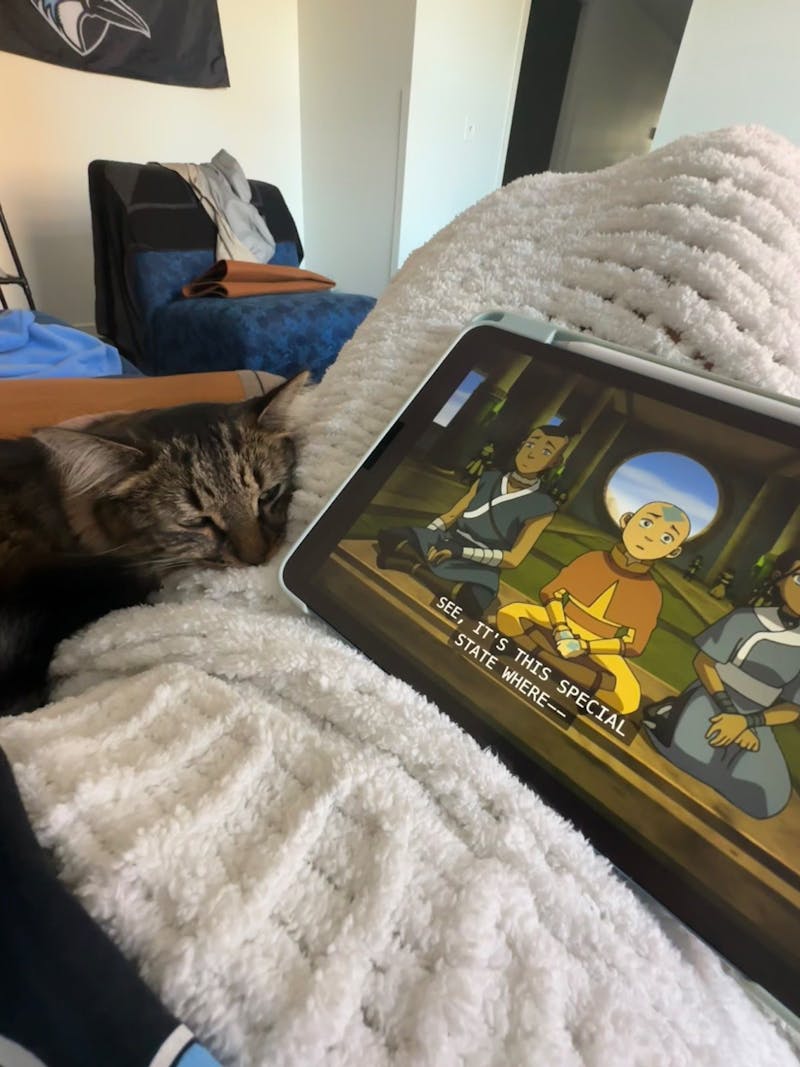
COURTESY OF AYDEN MIN
Min reflects on reconnecting with her girlhood whenever she watches the show Avatar: The Last Airbender.

COURTESY OF AYDEN MIN
Min reflects on reconnecting with her girlhood whenever she watches the show Avatar: The Last Airbender.
I sat on the floor a lot as a kid. Our hardwood floors were the perfect temperature to escape the heat of the summer daylight, and I would spend many afternoons starfished out on the floor, zoning out, or playing with my older brother’s LEGOs while waiting for my mom to finish cooking lunch. I would often sit in front of our family television — a smaller, chunky VIZIO model at the time — and watch whatever episode of Avatar: The Last Airbender (ATLA) was airing on Nickelodeon. I would sit there and watch episodes with my brother until the screen got hot and my mom told me I was sitting too close to the TV; that my vision would get worse. Only then would I tear my eyes away from whatever waterbending battle Katara was up to and scoot back, maybe three inches, still cross-legged.
If you ask me what my favorite character from ATLA was, I’d probably have a different answer each week. But one thing that will run in common is that it will always be one of the female characters. I didn’t know it back then, but I like to think that those characters inspired my early impressions of feminism. According to my mom, my favorite Disney princess was always either Mulan or Tiana. Yes, Mulan became a strong soldier and saved her country, but I saw her greatest strengths in her compassion for others. And yes, Tiana worked herself to the bone to open her restaurant, but behind that was undying affection and understanding of community. Some part of me always believed in “girl power” before I even understood what “politics” meant.
In ATLA, the female characters are written with so much nuance and care, but crafted in such unique ways, that it teaches young girls that they can care about different things and still be strong. Katara is sympathetic almost to a fault, but her greatest strengths come from her decisions to help others in need. Toph’s blatant confidence taught me that it is not overzealous to have pride in yourself and your achievements, and Suki’s perseverance showed me that girls can do hard things just as well as boys can. As juvenile as these statements may sound, I truly think that ATLA was — and still is — crucial to how I thought about myself and my abilities, especially at such a young age. So whenever I start to doubt myself or feel lost in this big world, I find myself returning to the struggles of the ATLA girls, see myself in them, and know that things will eventually turn out alright.
Perhaps most importantly, this show shaped not just my inner values, but also my role in applying these values to the world around me. One of the most complex themes of ATLA is war, genocide and the effects of these humanitarian crises on people in very real ways. Yet, the plot is written in such a way that makes themes of justice and conflict digestible to anyone and everyone. The female characters are never reduced to being only the providers or nurturers, but rather, they are major and powerful actors in the progression of the plot’s events and arcs. Seeing these girls — and not just the loud, antagonized military men — achieve big things and (quite literally) save the world instilled an early sense of hope in the soul of younger me. They are given agency and independence, and are able to think through complex dilemmas using their own experiences and worldview. In a plot where stakes are high and people are victimized by a century-long war, seeing girls as some of the most important problem-solvers is one of the biggest reasons why I still turn to the show for encouragement and strength.
Looking back on my childhood, my parents never pushed the stereotypical “girly” things on me. Sure, I did ballet and tap dance for a bit, but I also had my very own bright blue Razor RipStik and played a lot of video games with my brother. During my preteen years, I went through a tomboy-ish phase (and yes, an emo/punk rock phase as well), but I also liked shopping, trying on all of my mom’s dresses during spring cleaning, and painting my nails in different shiny colors. I do not attempt to strictly define feminism, girlhood or gender by saying this, but I say this because only recently have I really come to understand that younger girl that was me. Now I know it was not the activities, outfits or hobbies themselves that defined who I was, but rather the traits, attitudes and values that I kept with me. I will always be proud of the little girl that stood up for her friends, ran around as hard as she could during recess, and was not afraid of getting her pink tights a little dirty during a day of kindergarten.
So whenever I need a pick-me-up, I can always count on ATLA to lighten my load. Part of it is the lighthearted dialogue and the fact that I’ve watched it so many times I’ve nearly memorized it all. But most importantly, the girls in the show guided me in finding my way through girlhood. And whenever I watch the show, I feel like I’m sitting right next to younger me, wide-eyed and sitting cross-legged on the hardwood floor.
Ayden Min is a junior majoring in International Studies from Los Angeles, Calif. She is the Opinions Editor for the News-Letter.